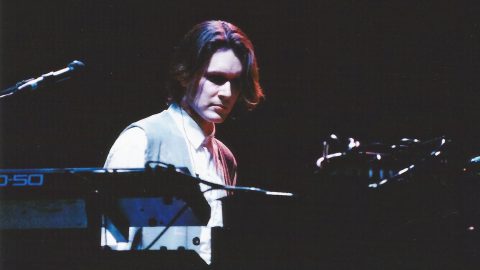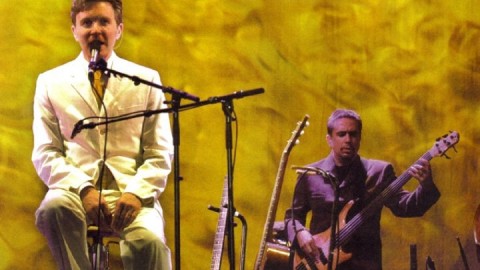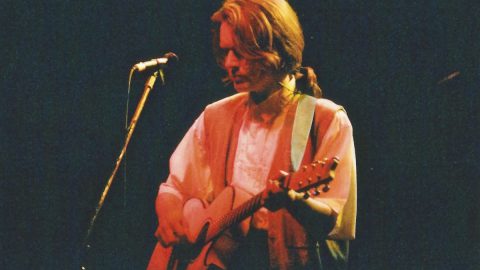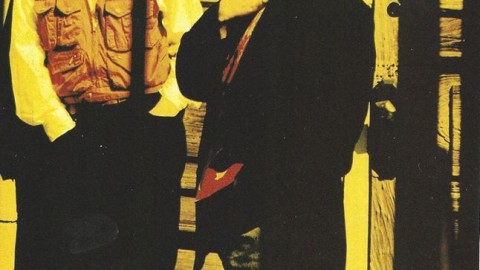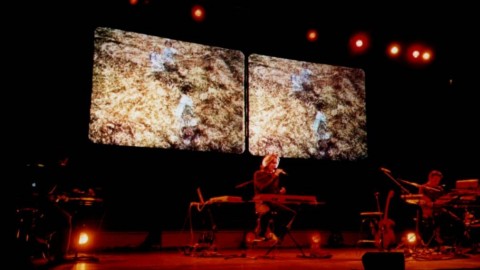
Eloquence accompanies maturity – by Cristiana and Antonio, originally published on the now defunct davidsylvian.it website.
Many thanks to Cristiana, Antonio and Mark from the davidsylvian.it website.
Cristiana: First of all I would like to thank you for letting me have this virtual chat with you. I know you don’t like going back on your past but please, follow me for a moment back to what I believe to be your point of departure: Ghosts. I got into Japan with Tin Drum (amazing) but then I got to know David Sylvian through Ghosts. That track hit me straight in the heart, making me realise that the guy on the cover, too beautiful and too blonde, was about to leave his place to a more real creature, who was beginning to make the first steps within himself. This is what I felt as a listener, but what did you feel when you were writing the piece? What was happening inside you?
David Sylvian: I guess many issues were beginning to rise to the surface around the time of writing Ghosts. On one level I was attempting to redirect the musical direction of the band, to move away from past tendencies and tropes and onto something more singularly identifiable as the sound of a band evolving, maturing, finding its feet for the foreseeable future. I wanted to work with arrangements of a more abstract nature as I felt them to be tremendously liberating, or else really refine the arrangements of the songs, delving further into electronics etc. Polaroids had been written relatively soon after the completion of Quiet Life and as such it was more an extension of that album rather than an evolution. Whatever was to follow had to redefine the band on some level. I guess this has already been well documented elsewhere. To speak more generally about that period in time I think it’s fair to say that cracks had begun to show between the four remaining members of the band. Or maybe, although I was the engine behind the group, I increasingly felt a lack of personal harmony within it, resentments seemed to arise out of nowhere. We’d begun to experience some success and I feel it possibly affected each of us differently to some degree. For my part I didn’t enjoy the trappings that came with it and would turn down more press and media than was perhaps advisable at the time. I also had an aversion to touring which was at odds with the everyone else involved with the band. So there was a burgeoning awareness on my part that something had to give, I had to work out what it was I was prepared to embrace and what I felt compelled to do away with. I was spending more time alone, withdrawing, trying to find answers in a what might be described as a relatively unsympathetic environment. The management of that time was extremely manipulative and saw, quite reasonably from a business standpoint, the opportunity for financial return after years of investment but, where in the past I’d been persuaded that my ambitions and goals were in alignment with the management’s, I’d begun to think otherwise. It was the first time I felt independent from both the community of the group itself and the hierarchical pressure of management which worked through me to lead the band etc. All very strange to look back upon now but we were quite young when we started out and the heavy hand of management stepped in quite early on in our development and we were only too grateful for its presence but, over time, I began to feel the need to side step the constant conspiratorial whispering in my ear, the cajoling advice, subtle puts downs which were designed to create doubt in personal judgement, and just follow my own instincts. So Ghosts was born out of that environment. Just when things should’ve, in theory, been getting easier in many respects I was plagued by doubt about where it was I was heading both personally and professionally. I wanted to wrest control from the puppet master and act as my own person, commit to what it was I felt passionately about and do away with the ‘sideshow’ elements. Although I’ve mentioned outside influences at work throughout the band’s time together I take full responsibility for my actions, failures and successes. I’m certainly not attempting to pass the buck. I could’ve wished for a more sympathetic, less manipulative and exploitative environment in which to grow but we’re saddled with what we’re given and, looking back, although I’ve obviously many issues with the way the band was managed, that management believed in me enough to invest time and money throughout some pretty lean years, I have to be grateful. I’m not certain what an alternate outcome would’ve looked like.
C: Let’s come back to more recent times. With Dead Bees you expressed a moment of joy in your life, you gave the impression of a perfect building, but which was already starting to show some cracks: with Blemish the building collapsed but, in the pain and desperation, there was still a ray of hope; Manafon is a dark labyrinth, where there are no points of reference, a battle between Eros and Thanatos, where Thanatos would seem to be winning. What happened to the hope? A flat baloon, like in your picture?
David Sylvian: The hope is there in the act of creation itself. This is alluded to throughout the album in its entirety. Ruud’s images allude to that place where the creative mind resides or the reservoir from which it draws. It is a work which takes a close look at death, with longing, not fear. It relinquishes an attachment to this world and acknowledges the potential void that follows on from death. This is all quite liberating in many respects but much depends on your personal cosmology. It’s also a depiction of a mind in torment. In other mediums we seem ready to accept and possibly embrace works born out of darkness but in popular music this is less readily the case. Lou Reed’s Berlin comes to mind along with a number of other exceptions. In film we have the works by the likes of Bergman, even Von Trier’s Antichrist bore more than a passing resemblance in some respects to the emotional and psychological unease which gave birth to Manafon. It’s not a question of presenting conclusions, tidy answers, in works of these kinds, it’s the quality and intensity of the questioning that’s important. Having said that, I wouldn’t imagine the average listener putting on manafon casually or repeatedly. It has a power and a potency perhaps not suited to all hours of the day or night but is available to a heart / mind that is in a particular state of need or receptivity.
C: Manafon on first listening upset me. I was overcome with a sense of death and feeling lost, a collection of emotions which were too strong to stand. During further listenings, for the first time since following your work, I had to try to remain detached. Was this an effect you tried to obtain or was it simply that you caught me in a particular mood?
David Sylvian: If you personally find it too strong to stand, and we’ve all come across works of this kind in our lives, you may not always feel this way about it but it does at least profess to its potency. When I’m confronted with works that repel, confuse or frighten me I’m compelled to repeat the experience over and over until I come to terms with the work. The fear or confusion exists in me and I’d want to root it out, have a good look at it in an unforgiving light. I’m attracted to works of these kinds and far less by those that make me feel overly comfortable/comforted. This is possibly due to the fact that we’re saturated by media, music in particular, most of which just washes over us without making a significant impact, without having a transformative affect of some kind. In cinema, theatre, literature, we might be slightly less forgiving of this tendency. In music we seem, on the whole, to require it but there’s room for other approaches and applications and plenty of examples out there with which to prove the point. I’d also like to point out something that only a few lone voices have made apparent, that there’s also a dark humour at play in some of the lyrics. Some of the characters depicted do have a tragi-comic element to them whilst acknowledging the reality of their personal suffering. For all our virtues we are are weak, vain and fallible.
C: You way of writing has changed with time: it is now drier, more direct, but perhaps more effective and of great emotional impact. I have always considered your writing as poetry, rather than just simply lyrics, and I now find they have new power. This will surely be because of many different factors, but would you like to talk about it?
David Sylvian: If they have a greater potency it might be due to the writing process as much as maturity. I’m not sure I’ve much more to say on the matter as you just do your best with what you have at your disposal at given any moment in time. You find yourself going about these things in pretty much the same way you always have but with a slightly shorter attention span perhaps. The commitment to complete a piece in one sitting, writing through to recording, is as much out of need due to changes in personal habits as it is necessary to keep the process itself fresh and alive. If you’re fortunate eloquence accompanies maturity.
C: What do the foxes represent, which so often come up in the lyrics of Manafon and now in Five Lines?
David Sylvian: They represent different things depending on context. In five lines they represent only themselves and the forces, the wildly ravenous elements, of nature.
C: In the track Sleepwalkers there is an image which I found particularly striking … “on the ladder of my spine”. Is this a metaphor you created or a precise reference to the Masonic philosophy?
David Sylvian: I don’t like to be complicit in the decoding of my own writing. Breaking a line down, making my intentions incontrovertibly one dimensional is a bit like summing up someone you know well with just a word. Justice can’t be served (madam). Nevertheless, I will answer in this instance in the hope of sidestepping any similar questions that might follow. No reference to the Masons was intended.
C: The Amplified Gestures film helped me a lot in understanding the musical part of Manafon. The enthusiasm of the musicians, especially the older ones, in playing with music and instruments allowed me to give a body and an organic sense to such fragmented music. Was this your intention? To help us to look from another point of view?
David Sylvian: I anticipated there might be a curiosity on the part of some of the listeners approaching Manafon as to its pedigree, the background of free improvisation, and the complete commitment to this approach/philosophy which governs both life and work for many of its practitioners. I wanted to produce a film that acted as an introduction, a primer, to those that I’d been working with who represented some of the best in the field. Once you know the degree to which these individuals commit themselves to this kind of engagement with the underlying principles of free improvisation, how they view and interpret them, you can’t, through ignorance, arrogance, or whatever the case may be, dismiss the results out of hand. These are extremely talented, intelligent, musicians who’ve chosen the path least trodden and if you take time to surrender to what it is they’re presenting us with you may have experiences you’d previously not thought possible, particularly if your listening diet has excluded improv up until that moment in time. I personally had my mind opened back in the 80’s when I first heard many of these players for the first time. In addition to the above considerations I also felt that many of the musicians were shamefully under documented. Despite having worked in this field for decades it’s still difficult to find film of them speaking on the philosophy behind the approach, it’s history, and how it informs other aspects of their lives etc. Another, full-bodied exploration of the musicians in this field deserves to be made. This is the best I was able to offer at this moment in time. You need know nothing about this background to get something out of Manafon which ultimately falls into another category of music entirely, possibly one of its own making, but the film is available should you wish to explore that particular avenue further (we shall release the DVD of AG independently in the coming year).
C: Sleepwalkers… let’s start with the cover. What was it that struck you about the visual art of Kristamas Klousch, which made you choose it as the album artwork?
David Sylvian: Was it Burrough’s or one of his characters that said something like ‘I consume images’.. ? I feel that to be more and more the case with the advent of the internet. I do ‘consume’ a lot of images in effort to build a library for the projects we release on samadhisound. Putting together artwork with audio has been one purely pleasurable part of my involvement with the label. When it came to Sleepwalkers, because it was a compilation, there wasn’t a clear image in my own mind for its public face so to speak. I’d come across Kristamas’ work some time back but I’d not made an intuitive connection between it and the album that I was piecing together but, over time, what was to become the cover image stuck with me and I decided to go with it. It seemed to convey a multiplicity of possible readings some of which were in direct contrast to one another. As a collection of images they seemed to reflect, in some form, the lyrical concerns of the title track which can be seen as an attack of some kind.. either on the narrator himself or others. Victim and/or perpetrator… likely both. A self contained sensuality, possible moral perversity, a deeper level of suffering, a corruption of, or fortress for, the protection of innocence. As I said, a multiplicity of readings which resonate between image and audio.
Antonio: Often recording artists give a gift by re-purposing themselves to the public with a compilation album. Often this gift seems to come about more from the necessity to pay homage to oneself and one’s own finances rather than the need to share something again. This can happen when such a compilation is merely a sequence of certain success after certain success, as if the general public is allowed only a single dimension of time and space: buy this, you will liberate the archive of your memories and the superfluous from yourself. I, in exchange, will give you a brand new song and a few vocal variations. Very often, but not always. Sleepwalkers goes beyond that, who gives us this gift is beyond that, and whoever receives it is obliged to admit that that, sometimes, we can still be surprised by something that we already know. On listening to it, as well as recognizing sounds we already know, like acquired rules which are perhaps reduced to pleasant habits, something new emerges, a new desire, a willingness to first regenerate and then re-present oneself. That is the gift, cerebral, stimulating. Authentic, in that it is new to anyone. We find ourselves in front of a sincere résumé, chosen with the canons of the honesty of an artist who goes beyond himself, while still remaining true to himself. This is not a question but a consideration, moved by the surprise of this compilation. I would like to know what you think of the overall result of the assembly of Sleepwalkers, with the relative adjustments to certain tracks. And what made you chose this sequence of tracks? (C: I agree with Antonio but I find that Ballad of A Dead Man strikes a discordant note)
David Sylvian: I’m obviously happy with the results. I was pleased if not occasionally surprised that the material, coming from such a variety of sources, sat well together (If I were to listen to the exceptions made by one and all, myself included, there simply wouldn’t be any material left to compile. That most of it holds together for the majority is as much as I can ask for). There were one or two exceptions where a piece felt out of context but the reason was generally related to the sonic nature of the mix or the recording rather than the composition itself. Pure Genius comes first to mind in this respect. Remixing the track helped it to sit more comfortably in its new surroundings. Hearing pieces in an alternate context can open open our ears to the song afresh, possibly enabling us to embrace it for the first time. It’s the re-contextualizing of the songs, gathering them together under one roof so to speak, that is the pleasurable part of putting something like this together. Compiling such a varied selection also sits well with the zeitgeist, the philosophy of pick ‘n mix, choosing tracks for download from a variety of sources for the making of one’s own compilations. To my regret, there’s far less emphasis on the album as single entity, a unified body of work.
C: Angels is beautiful, it fascinates me, it seems to be the narrative of a vision or a dream… is it?
David Sylvian: I was initially given a text by Erik Honoré from which to work. I took one or two images from that text and ran with my own interpretation. The piece is like a fever dream, the possible possession of an unbeliever, a derangement.
Antonio: Five Lines is an excellent new track in Sleepwalkers. Does it anticipate the revisiting of Manafon? Would you like to tell us something about your new work with Dai Fujikura?
David Sylvian: I guess Five lines does hint at the work to come on Manafon to a certain extent. The work with Dai is really in its infancy. We’re kind of testing the water in a variety of different contexts to clear the ground as it were for a more expansive work to come. The more we work on these miniatures, whether it’s a piece like Five Lines or a reworking of a song such as Small Metal Gods, the better defined the work ahead becomes. In a sense we’ve to narrow the field, limit the possibilities, and reveal to ourselves the framework for the project before committing to it with purpose. I’ve not had an experience of this kind with other collaborators but coming from such different backgrounds it’s important to know, and know with great clarity, that we’re speaking the same language. Yes, in affect we’re learning how to understand and interpret one another’s vocabulary.
C: I had only heard Sugarfuel before in a live context and to be honest I didn’t enjoy it. But this version is fantastic. There are other songs which you have performed live but never recorded, and I refer in particular to the Slowfire Tour. To be honest they are a little untidy, although we do manage to understand their potential … have you ever wanted to arrange them and give them more personality?
David Sylvian: I have a poor memory for these things but the only previously unrecorded original composition I recall performing on the Slow Fire tour was ‘I do nothing’. I did record a version of this song during the ‘Dead Bees’ session but I lacked the interest at the time to see it through. Not that I didn’t like the song, I did, but once something has been performed live I simply lose an all important personal connection with the piece. It’s as if it no longer belongs to me outside of the live setting. I’ve no problem with the pieces fading away into oblivion, alive so to speak, for the briefest of spells. My regret is that they’re not allowed to do so owing to the numerous bootlegs out there.
C: Due to a series of very casual events I happened to translate Mick Karn’s book Japan and Self Existence. It is quite interesting and enjoyable; he tells us a lot of the band’s adventures, he talks about himself and his weaknesses with a notable honesty and tells us quite a lot about you (if a little critically!). I really don’t think you will have read it but if you have, what do you think of it? We have all heard the beautiful A Certain Slant of Light; what do you feel for him in this moment of illness and difficulty?
David Sylvian: There’s much that could and perhaps should be said on this subject but this moment in time seems less than apposite so I’ll keep it brief. As far as Mick’s illness is concerned, I feel terribly for him. We’re no longer close but there are people in life with whom you’re connected for a reason. We’ve fulfilled karmic duties in one another’s lives. In that sense, if in no other, he’s family and the relationship will no doubt continue to play itself out. His illness has been protracted and involved considerable suffering, the kind you wouldn’t wish upon anyone. I wish him peace, something he appears to have known so little of in all the years I’ve known him. Peace and a haven from the inner demons that have plagued him throughout this lifetime. If I could, I’d embrace him and remind him how much I’ve always loved him and in that instance, for the duration of the embrace if not a moment longer, he would know it to be true.
Antonio: Some years ago I was in Amsterdam and I decided to spend the evening behind the window of my fourth floor rented apartment. For the whole evening, sitting on the couch with the lights turned off, I looked over to the old building opposite and noted that none of the windows had curtains. For a few hours I watched what was happening in that beehive of micro-worlds – someone was cooking alone, someone was reading a book in low lights, a serious looking couple were having their dinner in rigorous silence, a woman was doing her make-up then opened the door to her elegant partner and embraced him, and the evolution of all those situations. It seemed as if I was watching scenes from Kieslowsky’s Decalogue. Have you ever written any songs which have been inspired by the incoercible observation of other’s lives?
David Sylvian: I tend to draw from my own life. As I’ve said elsewhere, we contain multitudes. All is subjective and all that’s necessary for insight and illumination resides within.
Antonio: A personal curiosity: the book which has meant most to you in your life.
David Sylvian: I can’t say that a single volume comes to mind as there’s been so many that arrive at seemingly the right moment on one’s journey. I’ve also a fairly poor memory when it comes to the contents of books, novels in particular. I swear I could have a library of about 30 books and read them in cycles, each time as if for the first, but I do remember those that contained something that resonated deeply with me, the gist of the story remains or possibly a single scene that continues to echo throughout my life. Poetry has also played an important role in my reading life and in the category of non-fiction there’s been many books that have helped me along the way. Each right for its time.
C: We could ask thousands and thousands more questions but understand how busy you are, so we will leave you to your music. We hope that the magic of the winter be your muse.
My gratitude for your continued interest.
Sincerely
d


